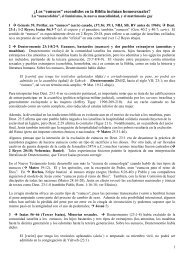Deuteronomy: - Fundación Otras Ovejas de Argentina
Deuteronomy: - Fundación Otras Ovejas de Argentina
Deuteronomy: - Fundación Otras Ovejas de Argentina
Create successful ePaper yourself
Turn your PDF publications into a flip-book with our unique Google optimized e-Paper software.
There shall be no whore (qe<strong>de</strong>shah) of the daughters of israel, nor a sodomite (qa<strong>de</strong>sh) of the sons of Israel.<br />
Thou shalt not bring the hire of a whore (zonah), or the price of a dog (keleb), into the house of the Lord thy<br />
God for any vow: for even both these are abomination unto the Lord thy God (Deut. 23:17-18, KJV). 55<br />
The same error is repeated in 1 Kings 14:24; 15:12; 22:46; 2 Kings 23:7; Job 36:14. Rea<strong>de</strong>rs who rely on ol<strong>de</strong>r<br />
translations may conclu<strong>de</strong> that the Hebrew Bible contains six con<strong>de</strong>mnations of ―sodomites,‖ although the original<br />
Hebrew spoke only of qa<strong>de</strong>shim (―consecrated‖ male prostitutes), with no reference to their sexual orientation.<br />
The Hebrew Scriptures frequently warn Israelite youth and men to abstain from sexual relations with prostitutes<br />
(� Proverbs). However, no one ventures to misinterpret such texts as a divine con<strong>de</strong>mnation of<br />
―heterosexuality‖—although this is precisely the error of those who seek to take from the references to the cultic<br />
prostitutes (mistranslated as ―sodomites‖) a con<strong>de</strong>mnation of ―homosexuality‖. Mo<strong>de</strong>rn translations now correct<br />
this grave mistake, making clear that the texts speak specifically of prostitutes—not of ―sodomites‖,<br />
―homosexuales‖ or ―heterosexuals‖ (see ―temple prostitute‖, NRSV, NIV).<br />
The Spanish Reina Valera 95 (RV95) and Dios Habla Hoy Study Bible (DHHBE) affirm in their i<strong>de</strong>ntical note on<br />
Deut. 23:18 what is both anachronistic and homophobic: ―The word dog <strong>de</strong>signates the homosexual male who<br />
practiced sacred prostitution in the temples‖. However, both the word and the mo<strong>de</strong>rn scientific concept of<br />
―homosexual‖ orientation were unknown until the late 19th century, and even had they been known, it would be<br />
impossible to <strong>de</strong>termine the sexual orientation of the prostitutes (it is likely that some were heterosexuals or<br />
bisexuals, since they served both sexes). In its note on the same text the Spanish Jerusalem Bible (NBJ) afirms<br />
correctly: ―‘Dog‘ <strong>de</strong>signates disrespectively the male cult prostitute [hieródulo]‖—without attributing any mo<strong>de</strong>rn<br />
concept of sexual orientation. Recent studies frequently even question whether the prostitution referred to was<br />
cultic or rather secular. 56 However, even if secular, the reference clearly is to prostitution, not to a consensual,<br />
loving commited relationship between adults of the same sex. Probably, however, the reference is to prostitution<br />
exercised by temple servants who were eunuchs and thus did not procreate sons who would have been involved in<br />
the questions of property and inheritance in the assembly of free males from which they were exclu<strong>de</strong>d (Deut 23:1;<br />
see eunuchs in 3.9-11 above).<br />
Conclusion of 3.12. Once we recognize that ―sodomite‖ is a grave error in translation of the Hebrew word<br />
qedoshim (cultic prostitutes), then the only basis for con<strong>de</strong>mning homoerotic relationships in <strong>Deuteronomy</strong><br />
disappears (� 1-2 Kings). That is, neither the Book of the Covenant (Exodus 20:22-23:19; 1200-800 BC) nor the<br />
Deuteronomic Co<strong>de</strong> (800-600 BC) contains a single prohibition of homoerotic relationships. Such relationships<br />
were acceptable and legal during almost the entire history of Israel, from Moses (1300 BC) until the postexilic<br />
period (538 BC and later) Such an un<strong>de</strong>rstanding of the legal history explains how the intimate relationship<br />
between David and Jonathan did not cause con<strong>de</strong>mnation for so many centuries (� 1-2 Samuel). Only the<br />
Holiness Co<strong>de</strong> (Lev. 17–26), the last part of the priestly laws (exilic and postexilic), contains two verses that<br />
prohibit anal sex between men (without prophylactics); � Leviticus. Even many fundamentalist theologians<br />
recognize that we should not con<strong>de</strong>mn a practice based on a few isolated texts of the Bible, since an untold number<br />
of individual texts reflect concrete historical contexts, not general norms. What is nee<strong>de</strong>d is to establish a<br />
historical continuity in the Bible and a theological, reasonable and scientific coherence in or<strong>de</strong>r to establish<br />
acceptable norms of sexual conduct today. The translation of qedoshim as ―sodomites‖ is only another example of<br />
the many ways in which ignorance, prejudice and homophobia have corrupted the correct interpretation of<br />
Scriptures and twisted the discourse of the churches about human sexuality (� The Song of Solomon).<br />
20

















